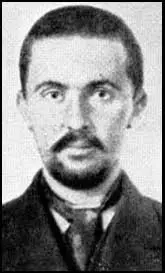Veljko Cubrilovic

Veljko Cubrilovic was born in Bosnia-Herzegovina in July, 1895. He became a schoolteacher in Priboj, but in 1914, as a member of the Black Hand secret society, agreed to help Gavrilo Princip, Nedjelko Cabrinovic, and Trifko Grabez to assassinate Archduke Franz Ferdinand. His brother, Vaso Cubrilovic, was also involved in the plot.
On Sunday, 28th June, 1914, Franz Ferdinand and Sophie von Chotkovato were assassinated by Gavrilo Princip. Princip and Nedjelko Cabrinovic were captured and interrogated by the police. They eventually gave the names of their fellow conspirators. Muhamed Mehmedbasic managed to escape to Serbia but Cubrilovic, Danilo Ilic, Vaso Cubrilovic, Cvijetko Popovic and Misko Jovanovic were arrested and charged with treason and murder.
All the men were found guilty. Under Austro-Hungarian law, capital punishment could not be imposed on someone who was under the age of twenty when they had committed the crime. Nedjelko Cabrinovic, Gavrilo Princip and Trifko Grabez therefore received the maximum penalty of twenty years. Vaso Cubrilovic got 16 years and Cvijetko Popovic 13 years. Veljko Cubrilovic, Misko Jovanovic and Danilo Ilic, who helped the assassins kill the royal couple, were executed on 3rd February, 1915.
Primary Sources
(1) Veljko Cubrilovic, statement in court (October, 1914)
I am an opponent of assassinations and revolutions for the traces they leave behind are too bloody. That is the case here. I believe in the evolution of the spirit, of ideas; I rely on progress, not on action.
(2) Dr. Rudolf Zistler defended Veljko Cubrilovic at his trial (October, 1914)
We must not lose sight of the fact that this is a historic trial; that the eyes of the whole world look on this illustrious court today; and that the world waits curiously for the sentence that will be pronounced in this hall of judgment.
Future generations and historians will speak of this trial. For this reason, the sentences must not be brutal; they must be just and endure as a bright page in the annals of criminal jurisprudence, before the tribunal of civilization, and of posterity.
